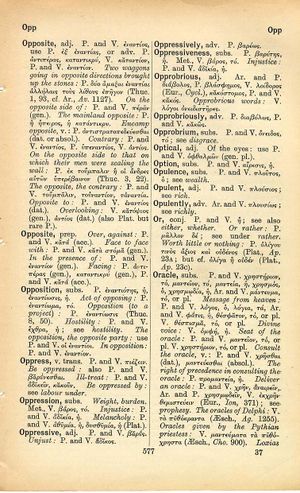opprobrium
English > Greek (Woodhouse)
subs.
P. and V. ὄνειδος, τό; see disgrace.
Latin > English (Lewis & Short)
opprō̆brĭum: (obp-), i. n. opprobro,
I a reproach, scandal, disgrace, dishonor, opprobrium (not in Cic. or Cæs.; syn.: dedecus, probrum, infamia). vereor, ne civitati meae sit opprobrio, si, etc., lest it should be a reproach, Nep. Con. 3, 4: et turpitudo generis opprobrio multis fuit, Quint. 3, 7, 19: opprobria culpae, Hor. Ep. 1, 9, 10.—
II Transf.
A A reproach, taunt, abuse, abusive word or language: morderi opprobriis falsis, Hor Ep. 1, 16, 38: fundere, id. ib. 2, 1, 146: dicere, Ov. M. 1, 758; Inscr. Lanuv. (133 B. C.) ap. Mommsen de Collegiis fin.—
B Of persons, a reproach, disgrace (like the Gr. ἔλεγχος and ὄνειδος): opprobria Romuli Remique, Cat. 28, 14: Cecropiae domus aeternum opprobrium, Hor. C. 4, 12, 7: pagi, id. ib. 2, 13, 4; Ov. M. 8, 155: majorum, Tac. A. 3, 66.
Latin > French (Gaffiot 2016)
opprŏbrĭum,¹¹ ĭī, n. (ob, probrum), opprobre, honte, déshonneur : opprobrio est alicui, si Cic. Rep. 4, 3, c’est une honte pour qqn, si ; Nep. Con. 3, 4 ; Quint. 3, 7, 19 || [en parl. de pers.] (Pisonis comites), obprobria Romulei Remique Catul. 28, 15 (ô compagnons de Pison), opprobres de Romulus et de Rémus, cf. Hor. O. 4, 12, 7 ; Tac. Ann. 3, 66 || injure, parole outrageante : Hor. Ep. 1, 16, 38.

